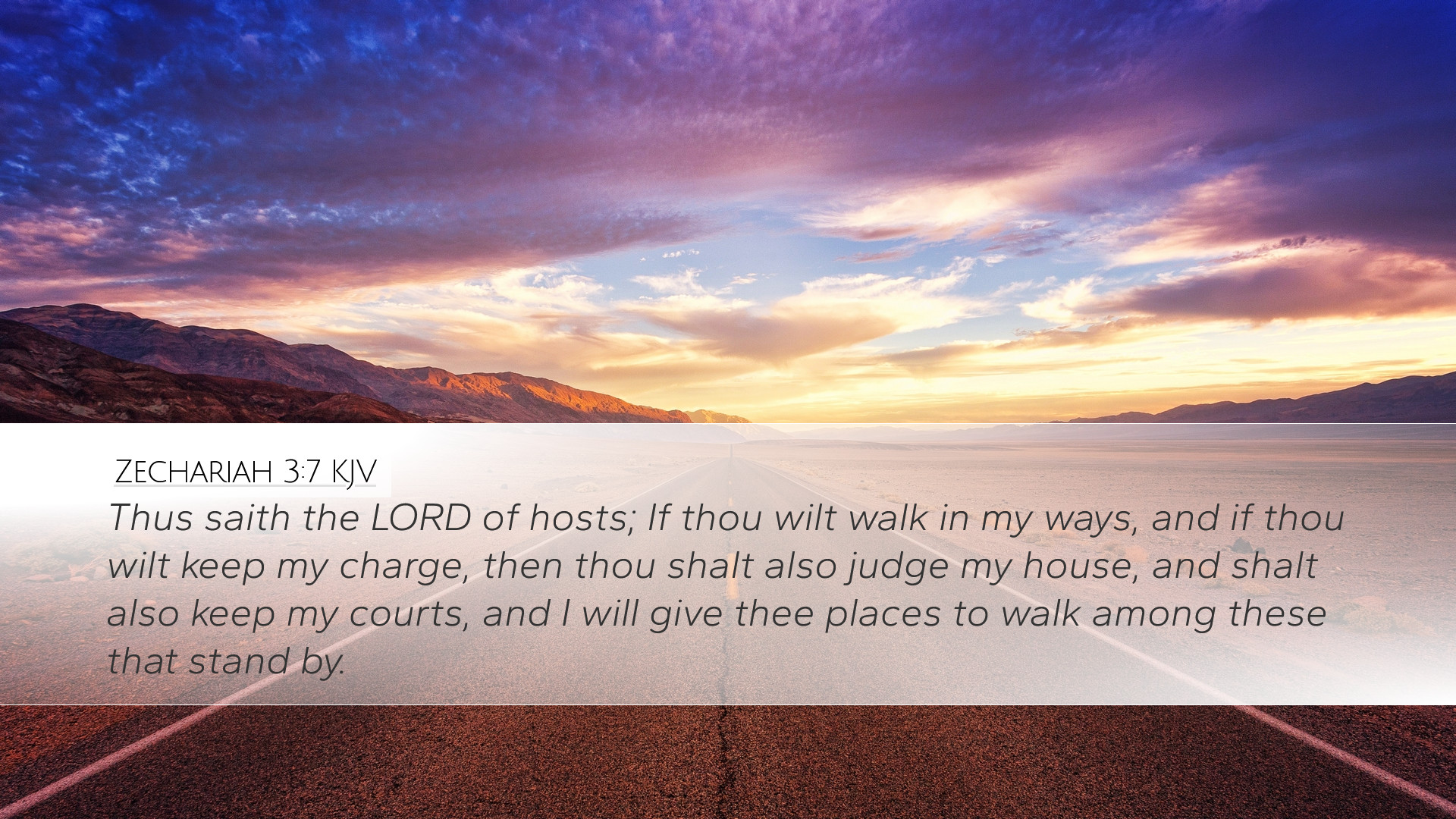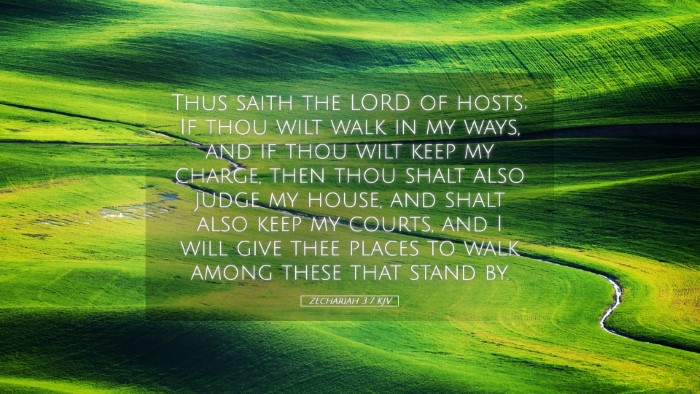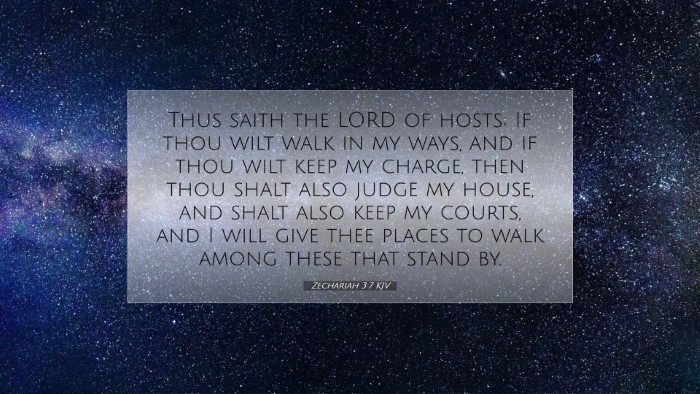Old Testament
Genesis Exodus Leviticus Numbers Deuteronomy Joshua Judges Ruth 1 Samuel 2 Samuel 1 Kings 2 Kings 1 Chronicles 2 Chronicles Ezra Nehemiah Esther Job Psalms Proverbs Ecclesiastes Song of Solomon Isaiah Jeremiah Lamentations Ezekiel Daniel Hosea Joel Amos Obadiah Jonah Micah Nahum Habakkuk Zephaniah Haggai Zechariah MalachiZechariah 3:7
Zechariah 3:7 KJV
Thus saith the LORD of hosts; If thou wilt walk in my ways, and if thou wilt keep my charge, then thou shalt also judge my house, and shalt also keep my courts, and I will give thee places to walk among these that stand by.
Zechariah 3:7 Bible Commentary
Commentary on Zechariah 3:7
Zechariah 3:7 states:
"Thus saith the Lord of hosts; If thou wilt walk in my ways, and if thou wilt keep my charge, then thou shalt also judge my house, and shalt also keep my courts, and I will give thee places to walk among these that stand by."
Introduction
This verse is part of a rich and profound vision experienced by the prophet Zechariah, where he witnesses the divine favor on Joshua the high priest. This commentary seeks to fuse insights from notable public domain commentaries to elucidate important theological themes and practical implications embedded in this text.
Contextual Background
Zechariah prophesied during the post-exilic period, a time when the Israelites were returning from Babylon and were tasked with rebuilding the temple and re-establishing their identity as God’s people. The prophetic messages delivered through Zechariah offered reassurance and exhortation pertaining to their renewed covenant relationship with God.
The Role of Joshua
Joshua, in this vision, represents not only the high priest but also the entire nation of Israel. Matthew Henry notes that Joshua's being clothed in filthy garments signifies the sin and guilt of the people. The Lord's action of removing these garments symbolizes the cleansing of Israel, illustrating God's fidelity to His covenant despite the people's failures.
Filthy Garments as Symbolism
The filthy garments that Joshua was wearing encapsulate the spiritual state of Israel—guilt-ridden and unworthy. Albert Barnes explains that these garments symbolize sin and the defilement that results from rebellion against God. This layer of understanding is essential as it establishes the need for repentance and renewal.
Conditional Promises
In this verse, God outlines conditional promises: the requirement to walk in His ways and to keep His charge. Adam Clarke emphasizes the significance of walking in God’s ways, which encompasses a life of obedience, righteousness, and devotion to God’s commandments.
Walking in His Ways
Walking in God's ways is a recurring biblical motif underscoring the relationship between faith and action. As seen in the Psalms, particularly Psalm 1, walking aligns with meditation on God's law. This relates to the importance of aligning one’s life with divine precepts and maintaining a commitment to spiritual disciplines.
Keeping His Charge
To keep God's charge is a call to stewardship over the sacred responsibilities entrusted to His people. This notion resonates deeply with pastoral and theological leaders today, signifying that one must be vigilant and faithful to the ministry God has placed before them. Failure in this charge can lead to severe consequences, as underscored in countless scriptural passages.
Consequences of Obedience
Should Joshua and, by extension, Israel remain faithful, they would be elevated to positions of authority—judging God’s house and keeping His courts. Matthew Henry interprets this elevation as not merely an honor but a serious responsibility, emphasizing that with greater authority comes greater accountability.
The Role of Judgment
The role of judging God's house reflects the priestly function of interceding for the people and maintaining purity within it. This spiritual leadership is foundational for any community of faith. Albert Barnes notes that this role includes both governance and teaching, calling leaders to exemplify godliness in their personal and public lives.
Walking Among the Standing Ones
The promise of “places to walk among these that stand by” signifies a close relationship with divine beings, likely referring to angels or heavenly hosts. Adam Clarke remarks on this imagery as a metaphor for service and communion with God. Being in such a place involves being in the divine presence, which is both a privilege and a high calling.
Heavenly Fellowship
This aspect serves as a reminder of the importance of spiritual alignment with God’s purposes. Those who keep His charge and walk in His ways can expect not only divine assistance but also a sense of belonging in the heavenly congregation. The imagery here evokes a sense of hope and reassurance, particularly in the face of adversity.
Theological Reflections
Zechariah 3:7 encapsulates profound theological themes such as grace, holiness, and the dynamics of justification. The cleansing of Joshua highlights the doctrine of redemption by grace—something that resonates throughout the entire biblical narrative.
Grace in the Old Testament
Some may assume that the Old Testament is solely about law, but this passage reveals God's grace manifested in the restoration of His people. It encourages contemporary understanding that no one is beyond the reach of divine mercy.
Holiness and Governance
The notion of holiness in governance resonates with the church today. Pastoral leaders are called to embody holiness in every aspect of their lives and ministries, setting an example for their communities. The call to judge God’s house is a weighty one, echoing the plea for integrity and authenticity in leadership.
Applications for Today
As contemporary followers of Christ seek to apply the truths from Zechariah 3:7, several pertinent lessons emerge:
- Emphasis on Repentance: Individuals and congregations must actively engage in repentance and seek continual renewal in their relationship with God.
- Faithfulness in Service: Ministry leaders must view their roles as both a privilege and a solemn duty to maintain purity and righteousness in God’s house.
- Understanding Grace: Believers should embrace the concept of grace that allows for restoration and transformation regardless of past failures.
- Community and Fellowship: A call to prioritize communal worship and support among fellow believers, reflecting the importance of walking alongside those who stand with God.
Conclusion
Zechariah 3:7 serves as a powerful reminder of God’s faithfulness and the transformative power of repentance and obedience. For pastors, students, and theologians, it challenges individuals to consider their own spiritual walks, roles, and the responsibilities they bear within the community of faith. The overarching message is one of hope, urging believers to turn to God, walk in His ways, and experience the fullness of His promises.


